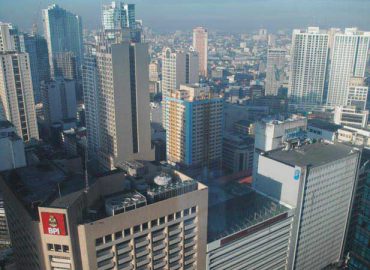By Jose Cielito Reganit, September 28, 2023; Philippine News Agency
https://www.pna.gov.ph/articles/1210673
MANILA – The House of Representatives on Wednesday approved on the third and final reading the proposed PHP5.768-trillion national budget for next year with a 296-3 vote with no abstentions.
Speaker Ferdinand Martin G. Romualdez said the timely passage of the 2024 General Appropriations Bill (GAB) just before Congress adjourns for a month-long break not only demonstrated the commitment of the House to upholding its constitutional role but also underscored its dedication to serving the Filipino people with transparency and accountability.
“Pursuing the constitutional requirement of transparency, the House of Representatives has to shepherd the national expenditure program no matter the rigors and challenges along the way. These include difficult discussions on the confidential and intelligence funds, which the House successfully steered toward a healthy and vibrant exchange,” he said before adjourning the session.
Romualdez lauded his colleagues for underscoring the need for agencies to abide by the strict accounting and auditing rules governing the handling and release of such funds and emphasized the need to safeguard its efficient and responsible utilization.
“As a result, the House was able to assess and evaluate the nature and use of these funds and correct any mix-ups and allay public concerns regarding this issue,” he said.
Earlier, the House leadership decided to reallocate confidential and intelligence funds, originally designated for non-security departments, to bolster security efforts in the West Philippine Sea.
A significant portion of these funds will now support the National Intelligence Coordinating Agency (NICA) and the National Security Council (NSC), organizations responsible for intelligence activities and national security coordination, respectively.
Additionally, the 2024 budgets for the Philippine Coast Guard and the Bureau of Fisheries and Aquatic Resources will be increased to enhance surveillance capabilities in the West Philippine Sea.
This decision was jointly announced by leaders of political parties, including Rizal 1st District Rep. Michael John R. Duavit, president of Nationalist People’s Coalition; Agusan del Norte 1st District Rep. Jose S. Aquino II, secretary general of Lakas-Christian Muslim Democrats; Romblon Rep. Eleandro Jesus Madrona of the Nacionalista Party; Surigao del Sur 2nd District Rep. Johnny T. Pimentel, vice president for Mindanao of PDP-Laban; Camarines Sur Rep.Luis
Raymund Villafuerte, president of National Unity Party; and Barangay Health & Wellness (BHW) Party-list Rep. Angelica Natasha Co, representing Party-list Coalition Foundation Inc. (PCFI), in response to recent incidents in the region.
Romualdez said the approval of the 2024 GAB also stands as a testament to the House’s commitment to the welfare of the Filipino people and their enduring pursuit of a more prosperous and equitable nation.
“Tiwala ako na hindi lamang makakatulong ang ipinasa nating budget para mapabuti ang kalagayan ng mga Pilipino. Susi rin ito para mag-tuloy-tuloy ang ating pagbangon tungo sa mas magandang kinabukasan (I am confident that that the budget we passed will not only improve the welfare of Filipinos, it is also the key for our continuous rise towards a better future),” he said.
He also acknowledged his fellow legislators, especially members of the minority bloc, for their diligent efforts and collaborative spirit in evaluating, scrutinizing, and dissecting the national budget every session day.
“What the minority bloc puts forth unto the process of lawmaking is truly essential and valued,” he said.
With their collective action, Romualdez expressed confidence that every centavo in the national budget reflects the overarching targets to usher economic transformation towards inclusivity and sustainability and aligns with the administration’s medium-term fiscal framework, the 8-point socioeconomic agenda, and the Philippine Development Plan 2023-2028.
Agenda for Prosperity
The proposed 2024 budget, equivalent to 21.7 percent of gross domestic product (GDP,) is 9.5 percent higher compared to the PHP5.268 trillion 2023 budget.
Anchored on the theme, “Agenda for Prosperity: Securing a Future-Proof and Sustainable Economy,” Pangandaman said the proposed national budget is framed based on the 8-Point Socioeconomic Agenda and will continue to support the goals of the Philippine Development Plan 2023-2028 of securing a future proof and sustainable vibrant economy.
Along with the agenda for prosperity, the proposed budget aims to expedite the recovery of the nation in a post-pandemic era, and transition the country towards a promising future of an inclusive and sustainable economy wherein “no Filipino is left behind.”
The social services sector –composed of health, education, culture and manpower development, as well as social security, welfare and employment among other social services– will receive the largest allocation of PHP2.183 trillion, or 37.9 percent of the total proposed national budget.
This represents an increase of PHP178.7 billion, or 8.9 percent, over the 2023 budget.
The education sector receives the largest allocation at PHP924.7 billion, including funds for the Universal Access to Quality Tertiary Education program, textbooks, and feeding programs. The Department of Education sees a 5.37 percent increase to PHP758.6 billion.
The economic services sector – which covers communications, roads and other transport; agriculture and agrarian reform, as well as trade and industry – will account for PHP1.709 trillion or 29.6 percent of the total proposed budget.
Infrastructure priorities include the North-South Commuter Railway System and Metro Manila Subway Project Phase 1.
The Department of Public Works and Highways gets PHP822.2 billion with allocations for road improvement; while the Department of Transportation’s budget doubles to PHP214.3 billion, focusing on mass transport and rail systems.
Agriculture receives PHP181.4 billion, supporting rice, corn and high-value crops production.
The Department of Health gets PHP306.1 billion, while the Department of Social Welfare and Development sees a 5.2 percent increase to PHP209.9 billion.
Meanwhile, General Public Services will receive PHP893.3 billion; debt burden at PHP699.2 billion; and defense sector at PHP282.7 billion, with the Department of National Defense’s budget rising by 14.16 percent to PHP232.2 billion.

